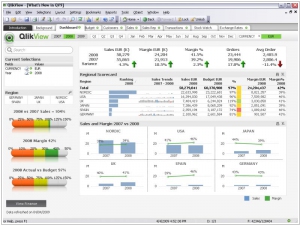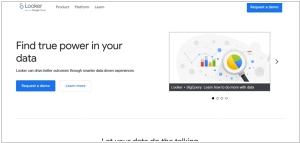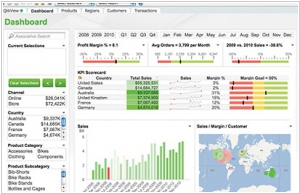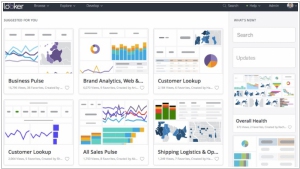Looker vs QlikView
July 24, 2023 | Author: Michael Stromann
15

The QlikView Business Discovery platform delivers true self-service business intelligence that empowers business users and drives innovative decision making. It helps organizations make transformative discoveries that lead to better decisions. QlikView goes beyond what other BI software provides by enabling users to analyze and search their data visualizations, make associations, and uncover insight that other BI tools can't find. What will you discover?
Looker and QlikView are both powerful business intelligence (BI) platforms, each providing unique strengths in data analysis and visualization. Looker is a cloud-based BI tool known for its user-friendly interface and intuitive data exploration capabilities. It allows users to create interactive dashboards and reports through its LookML language for data modeling. Looker's strength lies in its ability to provide real-time insights and foster a data-driven culture within organizations. On the other hand, QlikView is a data discovery and associative data model tool, known for its powerful data visualization capabilities. It enables users to explore data relationships and uncover insights through interactive and associative visualizations. QlikView's strength lies in its in-memory processing, enabling fast data retrieval and real-time analysis.
See also: Top 10 Business Intelligence software
See also: Top 10 Business Intelligence software
Looker vs QlikView in our news:
2022. Google unifies its BI services under the Looker brand

Google Cloud has made an exciting announcement, revealing its decision to consolidate all of its business intelligence products under the unified brand of Looker. This consolidation brings together Looker, Data Studio, and core Google technologies such as artificial intelligence (AI) and machine learning (ML). Google emphasizes that this integration goes beyond traditional dashboards, which are the specialty of Google Data Studio, enabling businesses to incorporate data into various workflows and applications for informed decision-making. As a part of this transition, Google Data Studio will now be known as Looker Studio. Looker itself was a startup that Google acquired in 2020 for an impressive $2.6 billion. With this unified approach, Google officially enters the competitive landscape, challenging established players like Tableau, Microsoft Power BI, and QlikView.
2016. Qlik updates its BI and analytics engine

Qlik, a leading provider of Business Intelligence and Analytics Platforms, has recently introduced the latest release of QlikView Enterprise 3.0. This release brings forth significant enhancements in terms of visual analytics, custom analytics app support, embedded BI, and developer innovations. With Qlik Enterprise 3.0, users now have access to a new development hub, enabling them to fully leverage the capabilities of the Qlik Analytics Platform for web mashups, custom applications, and extensions. The release incorporates a new app integration API, empowering users to seamlessly integrate their applications, a visualization API for the programmatic creation of analytics, and a new integrated developer environment (IDE) plugin for Visual Studio. These advancements aim to provide users with a comprehensive suite of tools and functionalities to maximize their utilization of Qlik's Analytics Platform.



